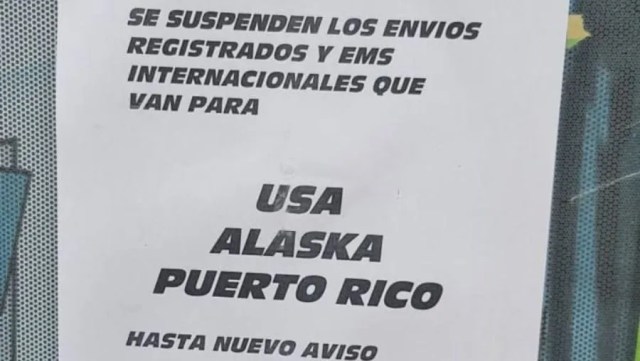It is news that at first glance may seem inconspicuous, but whose consequences could be immense: Mexico announced on Wednesday that it is suspending postal shipments to the United States. Not because postal workers are on strike or planes are missing, but because the Trump administration is shaking the very foundation of international parcel traffic – the so-called “de minimis” rule. Up to now, goods worth up to $800 could be imported duty-free into the US. An inconspicuous threshold that in reality turned out to be a motor of online commerce and transnational consumption: 1.36 billion packages with a total value of $64.6 billion reached American households in 2024 under this exemption. Now that is to come to an end. Starting Friday, according to Washington’s directive, even small shipments will be subject to duty. Mexico’s state postal service Correos de Mexico reacted with a step that may carry little symbolic power but enormous practical effect: effective immediately, no packages will be transported to the United States. “Mexico continues its dialogue with US authorities and international postal organizations to define mechanisms that will allow the orderly resumption of services,” the statement read. But the core is clear: for the time being, nothing flows anymore. With this, Mexico joins a growing list of countries pulling the emergency brake under Trump’s tariff policy. Postal services from the European Union, Australia, and Japan have also stopped their shipments. Everywhere the same uncertainty reigns: what fees, what formalities, what delays are looming once the “de minimis” threshold falls?

The consequences for the US are grave. Millions of American consumers who have long become accustomed to ordering cheap electronics from Shenzhen, spare parts from Mexico, or cosmetics from Europe with a few clicks will face higher prices, longer wait times, and in the worst case empty mailboxes. For small businesses that have built their business models on affordable imported goods, the new tariff practice means a blow to the core. Retailers who sell their products on platforms such as Amazon, Etsy, or eBay will now not only have to calculate higher costs but also deal with more complex customs processes – processes that large corporations can handle, but that overwhelm small retailers. The economic consequences are easy to quantify. In 2024 alone, goods worth $64.6 billion crossed the border under the “de minimis” rule. If this barrier falls, even moderate tariff rates hit brutally: a surcharge of ten percent alone means additional costs of over six billion dollars annually for American consumers and retailers, at 15 percent it would be almost ten billion, at 20 percent nearly thirteen billion. These are sums that do not disappear in balance sheets but are felt directly in people’s wallets – in more expensive consumer goods, higher delivery costs, and weakened purchasing power. At the same time, the conflict reveals the US dependence on precisely those supply chains that Trump has been rhetorically attacking for years. Anyone who processes $64 billion worth of goods through a tariff threshold within a single year shows above all one thing: that the United States is already entangled in a web of global micro-imports. If this stream is cut off, gaps arise that neither domestic production nor alternative trade routes can close in the short term.

For the people at the counters the break is already visible now. A mother took her two children to a post office in Mexico City on Wednesday to show them “how we used to communicate” – with letters, not screens. But she had to pack the envelopes back up: “With the new tariffs there are no shipments to the US,” she was told. Another woman cried outside the building because she could no longer send the ten-page letter and photos to her boyfriend in the States. Behind the postal blockade are months of stalled negotiations between Mexico and the Trump administration. To avert punitive tariffs, Mexico offered to crack down harder on drug cartels and even send dozens of imprisoned cartel bosses to the US – a gesture that underlined the seriousness of the situation. But Washington remained firm: without abandoning “de minimis,” no agreement. The post stops act like a menetekel: if even letters and parcels that for decades passed borders unhindered suddenly become the hostage of an aggressive trade policy, then it shows how far Trump is willing to go to sacrifice the everyday lives of millions for his tariff experiments. The immediate victims are the small gestures – a letter, a photo, a gift. The long-term consequences, however, reach deeper: rising prices, broken supply chains, an America squandering its role in global trade and hitting its own society with the tariff hammer. What is now happening in Mexico is only the beginning. Soon a package that costs hardly more than a dinner may no longer find its way across the border – and with it tear apart the seams of a world economy that has long depended on constant, seamless exchange.
Investigative journalism requires courage, conviction – and your support.

Welche anderen Länder haben eigentlich ebenfalls ihre Post- und Paketlieferungen in die USA eingestellt bzw. eingeschränkt? Ich hab auch dhl im Kopf. Und wie ist es umgekehrt, mit Sendungen aus den USA? gibt es da auch Be-/Einschränkungen?
rund 30-35, uns ging es aber rein um den regionale bezug, ansonsten ist die geschichte nicht so wichtig für uns
Deutschland hat schon vor geraumer Zeit die Freigrenze bei Paketen abgeschafft.
Folge, auch Waren in Höhe von 1 oder 2$ müssen verzollt werden.
Der Aufwand der Bürokratie für den Versender ist groß.
Kleine Shops oder Rescue Sanctuaries versenden nicht mehr nach Deutschland.
Nun setzt Trump das Gleiche um.
Allerdings ist der Warenwert mit 800$ fast dreimal so hoch, wie der in Deutschland war.
Das trifft fast jedes Paket im private und small Businesses Bereich.
Alles wird ddutlichst teure.
Aber Trump wird argumentieren, die Leute sollen nicht in China, Indien, Mexiko etc kaufen. Sondern Produkte „made in America“.
Nur gibt es die gar nicht. Oder zu horrenden Preisen.
Außerdem hat der Poststop für Trump boch einen positive Effekt.
Anstatt Briefe zu senden, werden Einige auf Email etc zurück greifen.
Da greift dann die Datenkrake Palantir zu …..
👍
Andere Länder auch! Heute Morgen gelesen.
Danke, ja, dass wissen wir. Wir haben nur wegen dem regionalen Bezug darüber berichtet, ansonsten hätten wir das Thema nicht aufgegriffen. LG